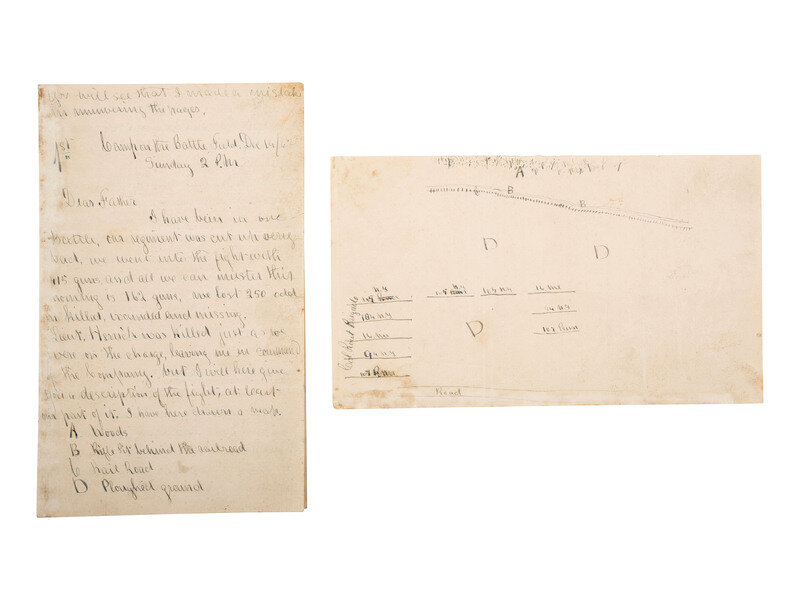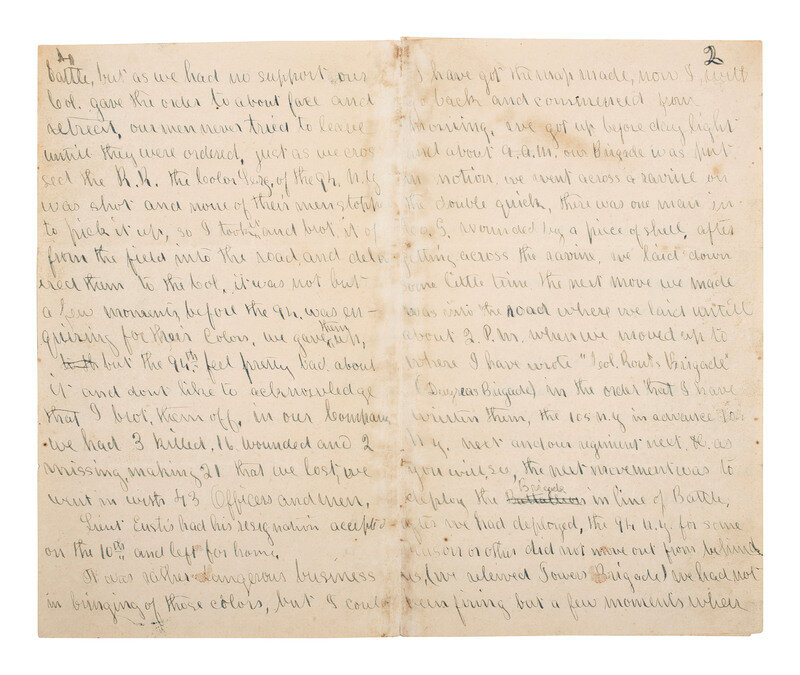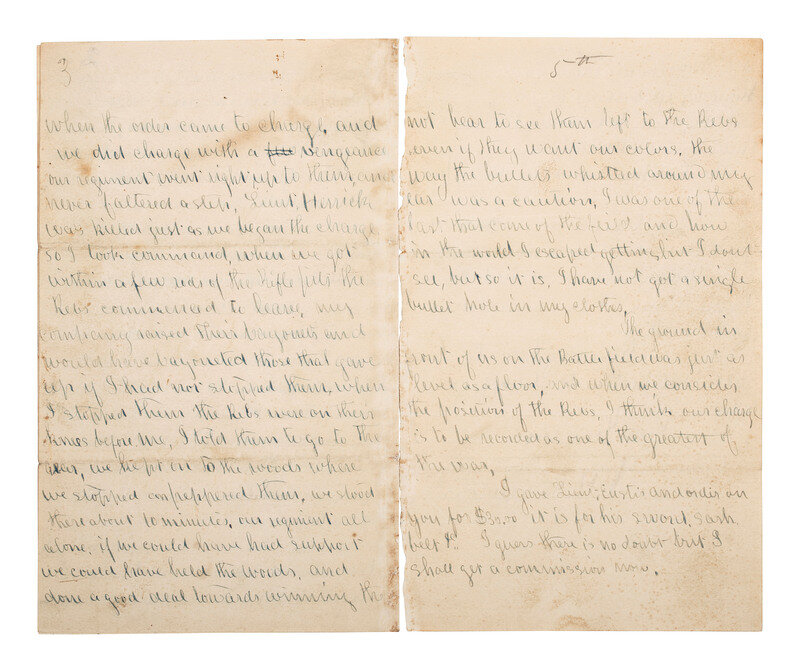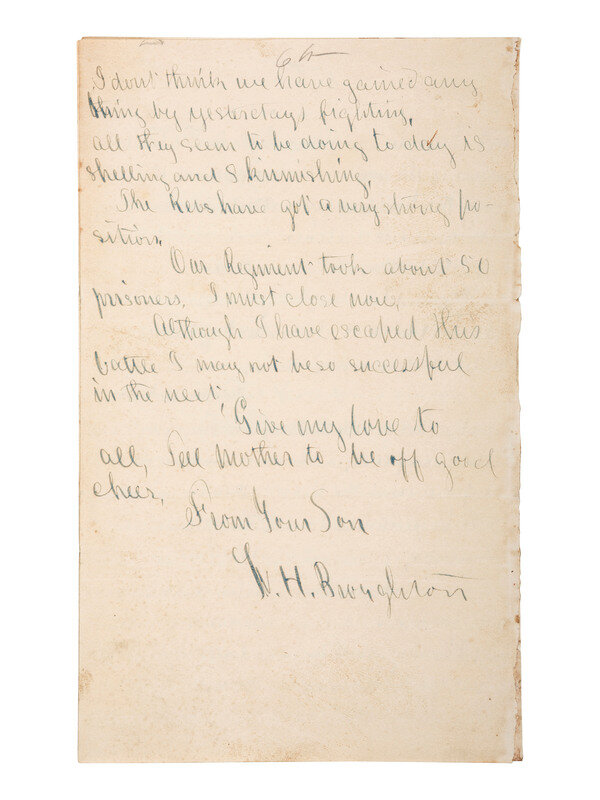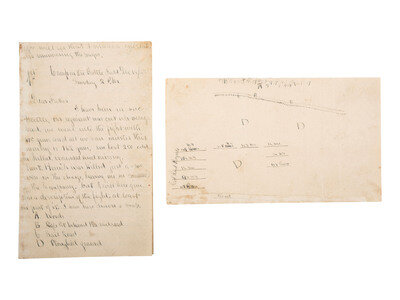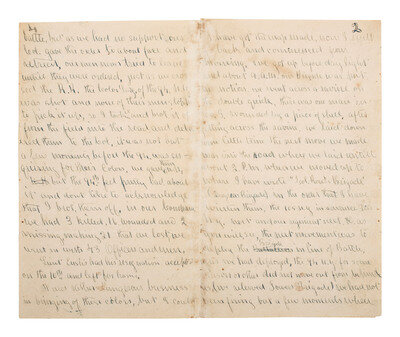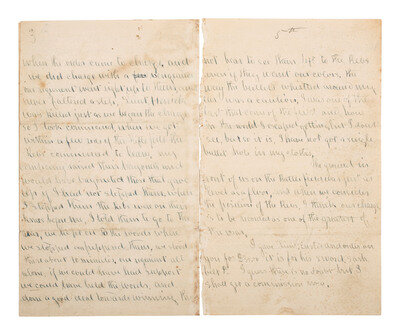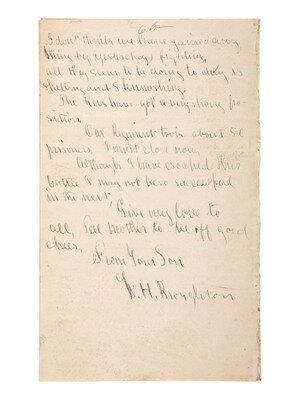[CIVIL WAR]. Battle of Fredericksburg letter with sketched map of battle lines by Sgt. William H. Broughton, 16th Maine Infantry Regiment, POW at Weldon Railroad. "Camp on the Battle Field," 14 December 1862.
Sale 1344 - American Historical Ephemera and Photography
May 31, 2024
10:00AM ET
Live / Cincinnati
Estimate
$800 -
$1,200
Own a similar item?
Request An Estimate
Sold for $603
Sold prices are inclusive of Buyer’s Premium
Lot Description
[CIVIL WAR]. Battle of Fredericksburg letter with sketched map of battle lines by Sgt. William H. Broughton, 16th Maine Infantry Regiment, POW at Weldon Railroad. "Camp on the Battle Field," 14 December 1862.
7 pages, 4 3/4 x 7 3/4 in., some leaves fully separated along spine, old folds, discoloration/dampstaining along edges.
In this letter to his father, William H. Broughton begins without pleasantries, getting directly to the point: "I have been in one battle, our regiment was cut up very bad, we went into the fight with 415 guns and all we can muster this morning is 162 guns, we lost 250 odd in killed, wounded and missing."
Broughton reports the death of Lieutenant Herrick, which left him in command of the company. He then turns to his description of the fight, referring to the map he has drawn, and gives a key identifying the components of the map as follows: "A Woods / B Rifle Pit behind the railroad / C Rail Road / D Ploughed ground."
Broughton then starts from the beginning of the morning of battle, making note of his and other units' movements up to the line of battle. He then explains, "we had not been firing but a few moments when the order came to charge, and we did charge with a vengeance our regiment went right up to theirs and never faltered a step. Lieut. Herrick was killed just as we began the charge so I took command when we got within a few rods of the Rifle pits the Rebs commenced to leave, my company raised their bayonets and would have bayoneted those that gave up if I had not stopped them, when I stopped them the Rebs were on their knees before me. I told them to go to the rear, we kept on to the woods where we stopped an [sic] peppered them, we stood there about 10 minutes, our regiment all alone, if we could have had support we could have held the woods, and done a good deal towards winning the battle..."
Instead, their colonel gave the order to retreat, and as they crossed the railroad, the color sergeant of the 94th New York was shot and the colors fell. Broughton picked up the colors and brought them to the colonel, who gave them back to the members of the 94th. He writes, "It was rather dangerous business in bringing of those colors, but I could not bear to see them left to the Rebs, even if they wernt [sic] our colors. The way the bullets whistled around my ear was a caution. I was one of the last that come of the field and how in the world I escaped getting hit I don't see, but so it is. I have not got a single bullet hole in my clothes "
Thinking about the potential legacy of the battle, and specifically the charge in which he participated, Broughton writes, "The ground in front of us on the Battlefield was just as level as a floor, and when we consider the position of the Rebs, I think our charge is to be recorded as one of the greatest of the war."
Going a step further, he describes that he has promised Lieutenant Eustis, who he earlier reported had his resignation accepted, thirty dollars for his accoutrements including his sword, sash belt, etc. He writes, "I guess there is no doubt but I shall get a commission now."
The final page of his letter features his sketch of the battle lines and positions of various regiments in his brigade.
William H. Broughton (1846-1882) enlisted as a private at the age of 16, on 14 August 1862. He mustered into Company D of the 16th Maine Infantry Regiment that same day. He was promoted to acting sergeant some time that year, and to second lieutenant after the Battle of Fredericksburg, on 31 December 1862, less than three weeks after the date of the letter featured here. He would be promoted twice more before the war's end, to first lieutenant in December of 1863, and to captain in November of 1864. He was taken prisoner at Weldon Railroad, Virginia in August of 1864, but was soon after paroled.
The 16th Maine saw a great deal of action during the war, participating significantly in Fredericksburg, Gettysburg, Chancellorsville, Mine Run, Wilderness, Spottsylvania Court
House, Laurel Hill, North Anna River, Totopotomy, Bethesda Church,
Petersburg, Weldon Railroad, Hatcher's Run, and more.
In this letter to his father, William H. Broughton begins without pleasantries, getting directly to the point: "I have been in one battle, our regiment was cut up very bad, we went into the fight with 415 guns and all we can muster this morning is 162 guns, we lost 250 odd in killed, wounded and missing."
Broughton reports the death of Lieutenant Herrick, which left him in command of the company. He then turns to his description of the fight, referring to the map he has drawn, and gives a key identifying the components of the map as follows: "A Woods / B Rifle Pit behind the railroad / C Rail Road / D Ploughed ground."
Broughton then starts from the beginning of the morning of battle, making note of his and other units' movements up to the line of battle. He then explains, "we had not been firing but a few moments when the order came to charge, and we did charge with a vengeance our regiment went right up to theirs and never faltered a step. Lieut. Herrick was killed just as we began the charge so I took command when we got within a few rods of the Rifle pits the Rebs commenced to leave, my company raised their bayonets and would have bayoneted those that gave up if I had not stopped them, when I stopped them the Rebs were on their knees before me. I told them to go to the rear, we kept on to the woods where we stopped an [sic] peppered them, we stood there about 10 minutes, our regiment all alone, if we could have had support we could have held the woods, and done a good deal towards winning the battle..."
Instead, their colonel gave the order to retreat, and as they crossed the railroad, the color sergeant of the 94th New York was shot and the colors fell. Broughton picked up the colors and brought them to the colonel, who gave them back to the members of the 94th. He writes, "It was rather dangerous business in bringing of those colors, but I could not bear to see them left to the Rebs, even if they wernt [sic] our colors. The way the bullets whistled around my ear was a caution. I was one of the last that come of the field and how in the world I escaped getting hit I don't see, but so it is. I have not got a single bullet hole in my clothes "
Thinking about the potential legacy of the battle, and specifically the charge in which he participated, Broughton writes, "The ground in front of us on the Battlefield was just as level as a floor, and when we consider the position of the Rebs, I think our charge is to be recorded as one of the greatest of the war."
Going a step further, he describes that he has promised Lieutenant Eustis, who he earlier reported had his resignation accepted, thirty dollars for his accoutrements including his sword, sash belt, etc. He writes, "I guess there is no doubt but I shall get a commission now."
The final page of his letter features his sketch of the battle lines and positions of various regiments in his brigade.
William H. Broughton (1846-1882) enlisted as a private at the age of 16, on 14 August 1862. He mustered into Company D of the 16th Maine Infantry Regiment that same day. He was promoted to acting sergeant some time that year, and to second lieutenant after the Battle of Fredericksburg, on 31 December 1862, less than three weeks after the date of the letter featured here. He would be promoted twice more before the war's end, to first lieutenant in December of 1863, and to captain in November of 1864. He was taken prisoner at Weldon Railroad, Virginia in August of 1864, but was soon after paroled.
The 16th Maine saw a great deal of action during the war, participating significantly in Fredericksburg, Gettysburg, Chancellorsville, Mine Run, Wilderness, Spottsylvania Court
House, Laurel Hill, North Anna River, Totopotomy, Bethesda Church,
Petersburg, Weldon Railroad, Hatcher's Run, and more.
Condition Report
The physical condition of lots in our auctions can vary due to
age, normal wear and tear, previous damage, and
restoration/repair. All lots are sold "AS IS," in the condition
they are in at the time of the auction, and we and the seller make
no representation or warranty and assume no liability of any kind
as to a lot's condition. Any reference to condition in a catalogue
description or a condition report shall not amount to a full
accounting of condition. Condition reports prepared by Hindman
staff are provided as a convenience and may be requested from the
Department prior to bidding.
The absence of a posted condition report on the Hindman website or
in our catalogues should not be interpreted as commentary on an
item's condition. Prospective buyers are responsible for
inspecting a lot or sending their agent or conservator to inspect
the lot on their behalf, and for ensuring that they have
requested, received and understood any condition report provided
by Hindman.
Please email [email protected] for any additional information or questions you may have regarding this lot.
